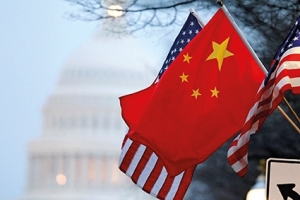China – US Relations: The Need for Talks to Overcome Misperceptions
As experts and politicians all over the world seek to grasp the key contours of emerging world order, sometimes dubbed the Post-Post-Cold War Era, there are few things agreed upon by the vast majority of them. Only one issue is clear: US – China relations will define the course of the 21st century. Will the US be able to accommodate the rise of China, keeping its role as a top global power? Will China be ready to be a part of the Western-created world order? Or will it try to do that, simultaneously amending it to Beijing’s goal to establish China as a centered global order? Perhaps the key question regardless of future developments is: will both sides be able to manage their relationships and avoid overt conflicts or is a future China – US clash inevitable?
Western and Chinese perceptions of mutual intentions differ. According to conventional Western thought, China’s key goal in the 21st century is to establish its zone of influence over the vast neighborhoods of Eurasia, transforming its economic might into geopolitical leverage and to challenge the US as the sole superpower with a long-term goal of undermining US-supported world order. The latest US National Security Strategy clearly depicts China as a revisionist power. The Western experts explain the contradictions between China and its neighbors in the South China Sea through this prism, as “clear proof” of China’s growing ambitions for regional supremacy. Thus, the US strongly believes in the necessity of China’s containment, viewing the big Chinese neighbors, India and Japan, as natural allies in this situation. The Chinese Belt and Road initiative is perceived through this lens, as a clear geopolitical project aiming to increase Chinese influence over the participating states and making China better able to compete with the US.
However, China’s perceptions of Beijing’s goals and motives are different. According to some top Chinese experts, the key source of misperception is the difference between Western and Chinese concepts of developments. The Western concept of development inextricably contain the notion of exploiting others’ resources for own advancement. The inter-European wars, as well the history of European colonialism, covering vast territories of Asia, Africa and America and large-scale slave trade, prove this notion of Europeans exploiting others’ resources for development. Thus, Europeans are viewing the Chinese growth-oriented policy through their own lens: Chinese development will usher in the exploitation of outside resources, first of all neighboring states, and later spreading through the Euro Atlantic area, with the Belt and Road initiative being the main vehicle of this policy.
However, the Chinese concept of development is based on two key pillars: hard work and use of its own resources. Thus, Chinese strategic culture does not envisage the inevitable exploitation or simple robbery of outside resources. The Chinese experts argue that the West should not perceive China based on its own calculations and should understand the differences in conceptual level to avoid misunderstandings.
Beside these conceptual issues, the recent steps taken by President Trump’s administration to embrace unilateralism, reject globalization and undermine international institutions such as the World Trade Organization, makes things more complicated. The US withdrawal from the Iran nuclear deal and imposition of secondary sanctions against European companies who continue business with Iran, aggressive use of tariffs and other protectionist means not only against China but also against several EU and NATO member states, repeated statements targeting US allies to stop free-riding and paying the necessary price for American protection, creates serious cracks in Trans –Atlantic bonds and makes the future of Euro-Atlantic institutions less predictable.
Meanwhile, China acts in the opposite direction. During the 8th Beijing – Xiangshan Forum held in Beijing in October, the Chinese Communist Party Politburo Standing Committee member, Chairman of the Standing Committee of the National People's Congress, Li Zhanshu stated that China is committed to multilateralism, supports the UN-centered multipolar world, rule-based free-trade system, rejects unilateralism and will never seek hegemony over its neighbors. Another interesting notion recently put forward by China is the rejection of alliances as exclusive blocs supporting small groups of states and targeting third parties. Instead, China promotes the idea of establishing partnerships as ways to provide for win – win cooperation among states. China views the Belt and Road initiative as a model example of a partnership-based approach.
China and its neighbors are actively embracing this notion. In October, China and Japan signed agreements to jointly implement more than 50 projects in Belt and Road member states. China, Japan, India, South Korea, New Zealand and Australia have launched negotiations with ASEAN to sign a “Regional Comprehensive Economic Partnership” free trade agreement, which will create the world largest free trade zone. On November 14, during RCEP member states meetings in Singapore, the Chinese Prime Minister Li Keqiang emphasized that the deal should be signed in 2019. Simultaneously, China has started negotiations with Japan and South Korea to develop a free trade agreement between the three states. Thus, almost all Asian economies are involved in different layer negotiations with China to promote rule-based free trade partnerships.
Without doubt, the active cooperation of Japan and South Korea with China does not mean their rejection of a strategic alliance with the US. The American involvement in East Asia remains a key pillar for Japan and South Korea’s hard security, especially given the unpredictability in North Korean nuclear talks.
Thus, the world is moving towards a multi-center construction where different centers will have simultaneously diverging and overlapping interests and will cooperate or compete with each other based on a case-by-case approach. However, the US – China relations will remain the key issue of world geopolitics for decades to come and there is an urgent necessity to have more bilateral talks to avoid unnecessary escalations.
By Dr. Benyamin Poghosyan, Executive Director, Political Science Association of Armenia
Image source: asia.nikkei.com












